SMT Pick and Place Machine Efficient and Precise Automated Placement Solutions
“Automated SMT pick and place machines enhance PCB assembly precision, accommodate a variety of component types, and perfectly align with modern electronics production needs.”
- High-speed, precise operation to boost production efficiency
- Compatibility with various component specifications, adaptable to complex applications
- Automated operation that reduces manual intervention
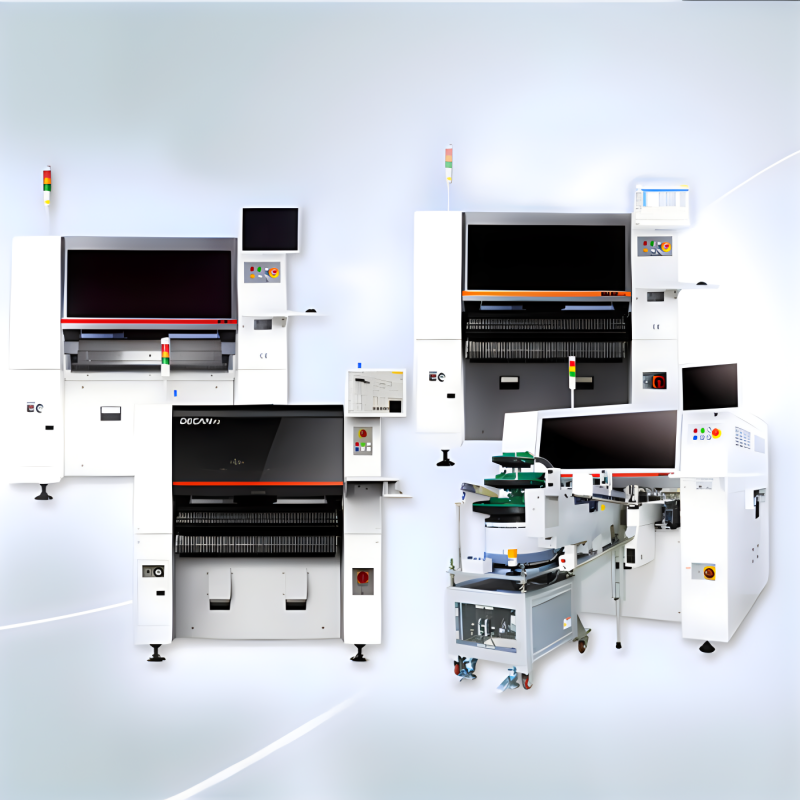
pick and place machine manufacturers
We have collected the most popular international SMT pick and place machine brands on the market to help you gain a deeper understanding of the advantages, technical features and application scenarios of each brand. By comparing SMT machines of different brands, you can make the most appropriate choice.
Hanwhan decan S2
JUKI RS-1R
Yamaha YSM20R
FUJI NXT III
Panasonic NPM-W2
Hanwhan DECAN SM series
What is A pick and place machine
A Pick and Place Machine (also known as an SMT Machine) is an essential piece of equipment used in the Surface Mount Technology (SMT) process for assembling electronic components onto a printed circuit board (PCB). It automates the task of placing small electronic components, such as resistors, capacitors, and integrated circuits (ICs), onto the PCB surface in precise locations.
How it Works:
Component Feeding: The machine is fed with components, typically in tapes or reels, which are picked up by a robotic arm or nozzle.
Placement: The robotic arm then places the components onto the PCB according to a predefined design or layout. The machine uses vision systems (cameras) to ensure precise placement and alignment of components.
Speed and Precision: The machine operates at high speeds while maintaining extremely high accuracy, which is essential for mass production and high-quality electronics manufacturing.
Automation: The process is highly automated, reducing the need for manual labor, increasing production efficiency, and minimizing errors.
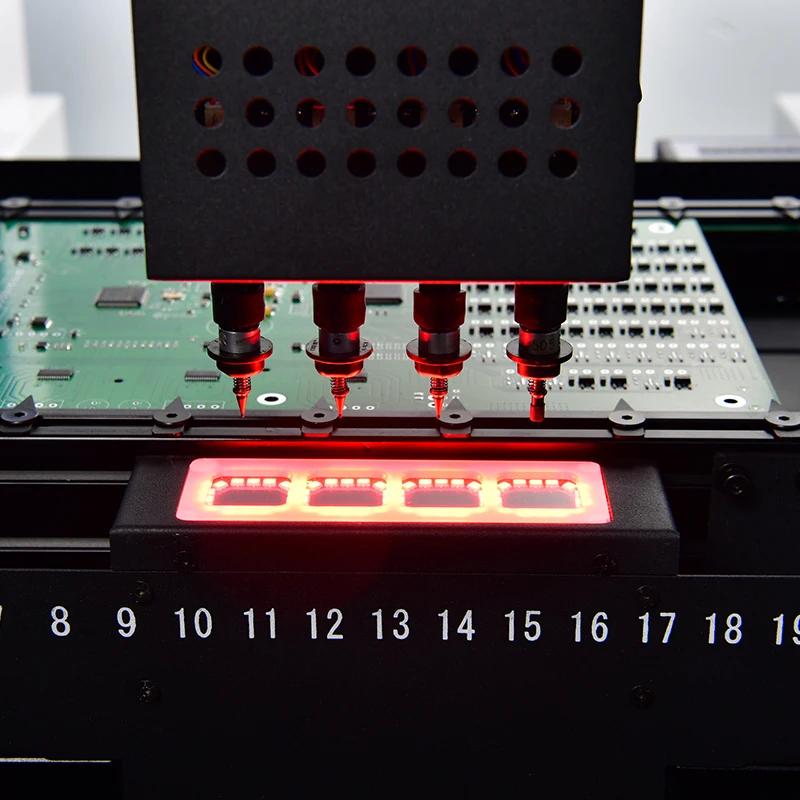
How does a pick and place machine work?
A Pick and Place Machine is a crucial piece of equipment in modern electronics manufacturing, primarily used to accurately and rapidly place Surface-Mounted Devices (SMD) onto printed circuit boards (PCBs). The machine’s working principle involves several key steps, including component pickup, alignment, placement, and precise visual inspection.
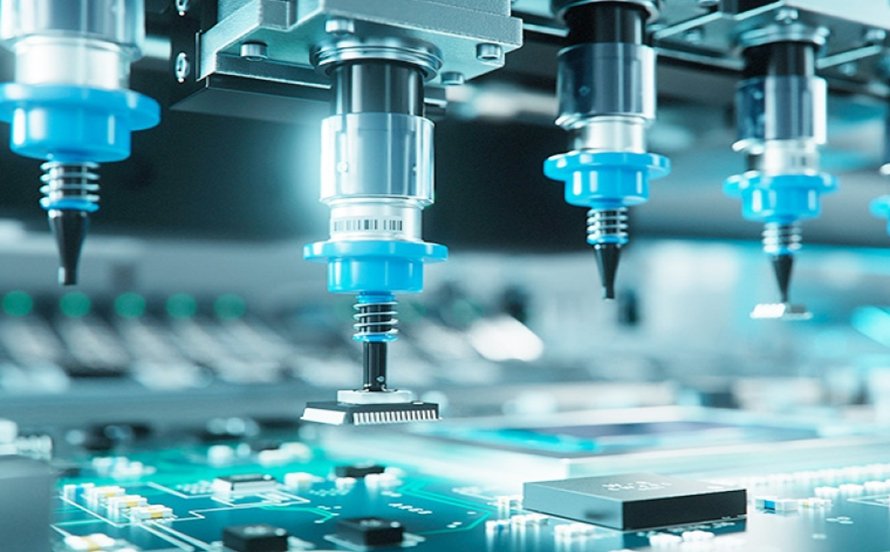
Component Picking
The machine first picks up electronic components from storage systems such as tapes, trays, or sticks. These components are usually stored in reels or trays, and the machine uses robotic arms or nozzles with suction cups or grippers to pick the components. This process is automated to ensure a high-speed and high-precision operation.

Positioning and Alignment (Vision System)
Once the component is picked up, the machine uses a vision system, which typically includes high-resolution cameras and image-processing software, to align the component. The vision system scans the component's markings or edges to confirm its orientation and ensure it’s properly aligned before placement. This step ensures that components are placed in the correct position, avoiding misalignment or flipping.
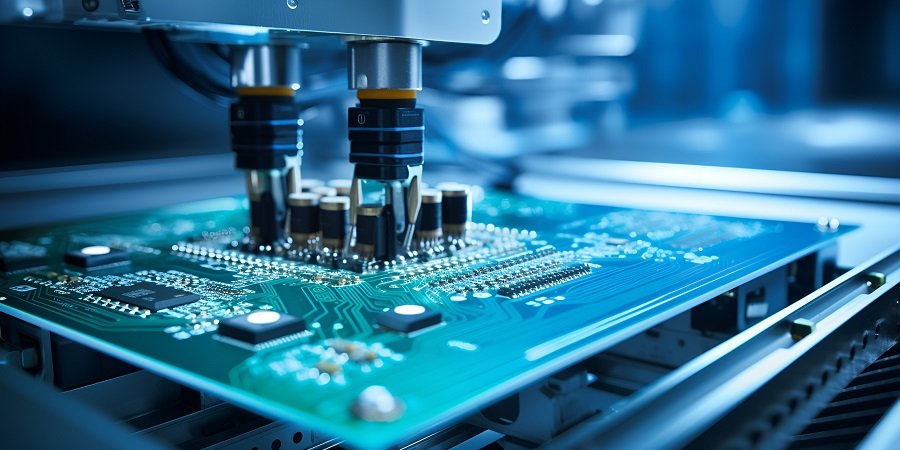
Component Placement
After precise alignment, the pick and place machine’s robotic arm (or XYZ-axis movement system) moves the component to the designated position on the PCB. The arm places the component with high accuracy on the PCB’s pads. This step is critical, as the correct placement ensures reliable electrical connections and proper functionality of the PCB.
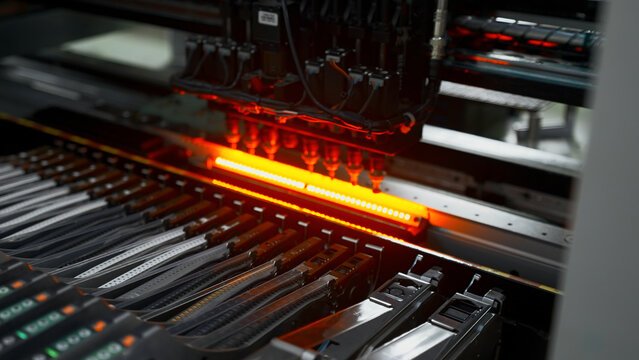
Preparation for Soldering
Once the component is placed, it rests on the PCB surface. The next step typically involves the board passing through a reflow soldering oven, where the solder paste melts, and the components are securely attached to the PCB. In some cases, components may require manual soldering, but most modern machines can handle the entire process.
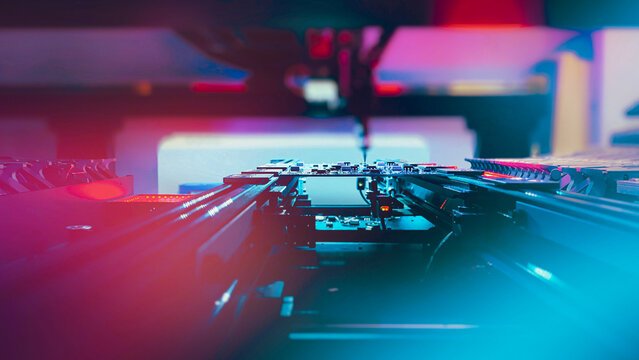
High Precision Control
One of the core advantages of pick and place machines is their high precision and speed. To ensure that each component is placed correctly, the machine continuously adjusts the robotic arm’s movement to achieve micron-level accuracy. The vision system also performs real-time checks on the placement results, ensuring there are no discrepancies.
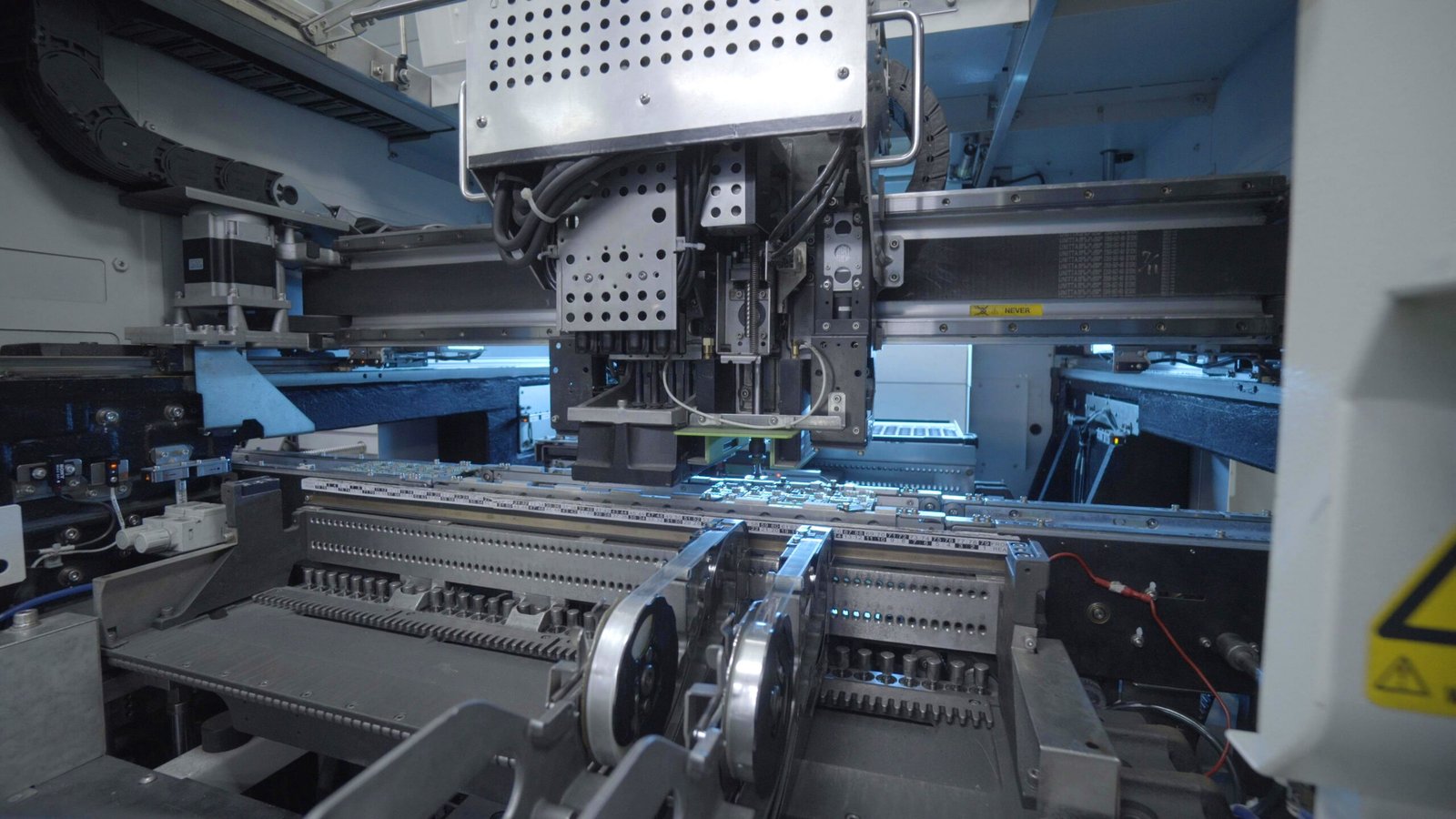
Automation and Smart Features
Modern pick and place machines come with advanced automation and smart features. These machines can automatically identify components, pick, and place them based on predefined programs. They can switch between different component types and adapt to various PCB designs, reducing human intervention and increasing production efficiency. Some machines even adjust settings automatically to optimize the process for different production runs.
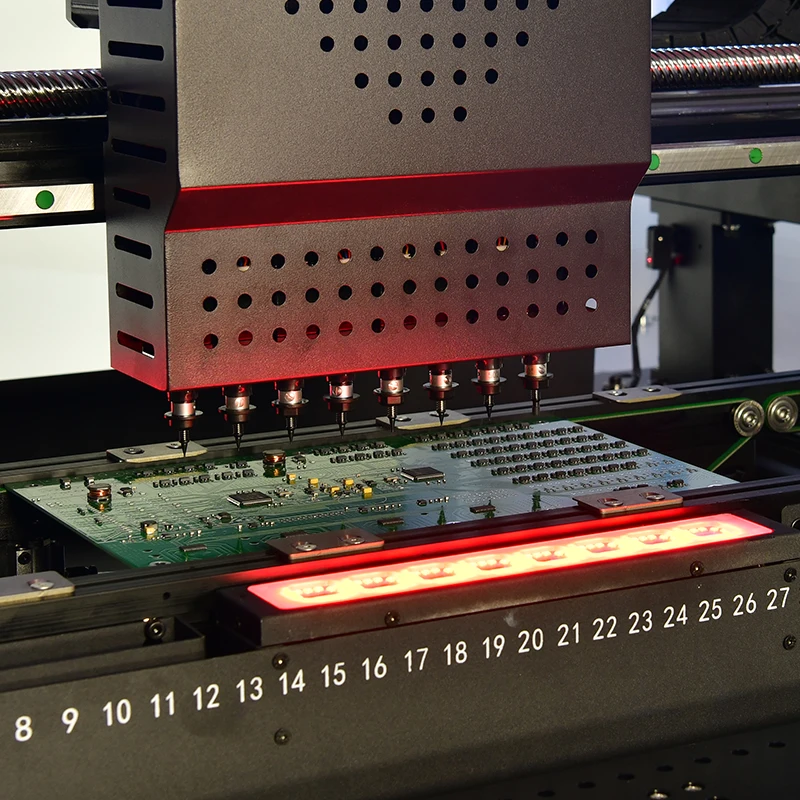
Multi-tasking
Some advanced pick and place machines feature multi-tasking capabilities. They can simultaneously handle different types of components using multiple nozzles, which significantly boosts production speed. This feature allows the machine to place several components at once, enhancing overall throughput.
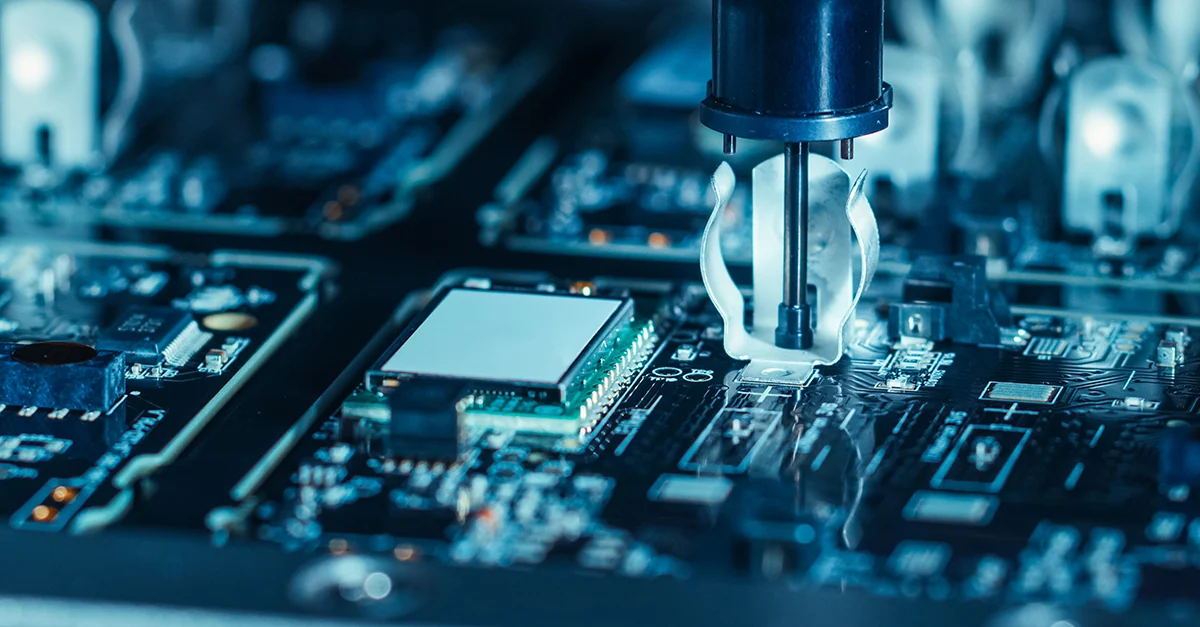
Summary:
The working principle of a pick and place machine is based on highly automated robotic arms that pick up electronic components from storage devices and precisely place them on PCB pads. Its core technologies include a precise vision system and robotic arm control, ensuring high-speed and high-accuracy operations. With advancements in technology, modern pick and place machines have become more intelligent, offering greater flexibility, higher productivity, and the ability to handle a wider variety of components and production needs.
How to choose a pick and place machine ?
Choosing the right Pick and Place Machine is crucial for optimizing production efficiency, reducing costs, and ensuring product quality. Here are the key factors to consider when selecting a pick and place machine:
Production Requirements and Volume
Component Types and Specifications
Placement Accuracy and Precision
Automation Level
Flexibility and Configuration
Maintenance and Support
pick and place machine Types
Pick and Place Machine can be mainly divided into the following types according to different production requirements and application scenarios.
Fully Automated Pick and Place Machines
Fully automated pick and place machines operate with minimal human intervention. They are designed for large-scale production, with full automation of component identification, picking, placement, and PCB assembly. These machines are highly efficient and typically used in mass production environments.
-
Fully automated operation with minimal human intervention
-
High-speed and high-efficiency placement
-
Automatic component changeover and setup adjustments
-
Real-time monitoring and adjustments for optimal performance
Applications: Large-scale production lines, smart hardware manufacturing, industrial electronics.
Smart Pick and Place Machines
Smart pick and place machines integrate advanced technologies such as Artificial Intelligence (AI) and machine learning for self-optimization of the placement process. These machines are capable of detecting errors and adjusting in real-time, ensuring high production quality with minimal human intervention.
-
AI-based vision systems for self-adjusting and error correction
-
Capable of real-time diagnostics and troubleshooting
-
High automation and smart features to reduce human error
-
Integrated with data analytics for production optimization
Applications: Advanced electronics manufacturing, smart factories, automated production systems.
Summary:
Different types of pick and place machines can meet various production needs, from high-speed mass production to high-precision small batch tasks. The choice of machine depends on factors such as component complexity, production volume and required precision. Contact us to get the most suitable quotation for you.
Applications: High-precision electronic devices, medical devices, aerospace applications.
High-speed pick and place machines are designed for large-scale production where speed is crucial. They are capable of placing a high volume of components quickly, typically suited for simple, standard PCBs and large batch productions.
-
Extremely fast placement (often over 50,000 components per hour)
-
High-speed operation, suitable for standard components
-
Ideal for mass production on assembly lines
Applications: Consumer electronics, communication devices, automotive electronics.
Precision Pick and Place Machines
Precision pick and place machines are used for tasks that require very high placement accuracy. They are capable of handling very small components (such as 0201 or smaller) and are ideal for complex and high-precision PCB layouts.
-
Ultra-high precision (typically ±0.02mm or smaller)
-
Capable of handling very fine and small components
-
Equipped with high-accuracy vision systems for precise placement
-
Suitable for small batch or high-precision manufacturing
Applications: High-precision electronic devices, medical devices, aerospace applications.
Multi-functional Pick and Place Machines
Multi-functional machines are versatile, capable of handling various component types and sizes, from small SMD components to larger ones. These machines are flexible and suitable for a wide range of production environments, including customized or low-volume manufacturing.
-
Supports a wide range of component types and sizes
-
Multiple nozzles for simultaneous placement tasks
-
Flexible programming and settings for different PCB designs
-
Ideal for small to medium batch production or prototype development
Applications: Prototyping, customized electronics, small batch production.
High-Density Pick and Place Machines
High-density pick and place machines are designed for applications where many components need to be placed within limited space on high-density PCBs. They are ideal for complex circuit boards with many small components or high-layer count boards.
-
Capable of handling high-density, multi-layer PCBs
-
Supports precise and fast placement for complex layouts
-
Equipped with multiple vision cameras for alignment and quality control
-
Designed to handle a large number of components in a small space
Applications: Smartphones, tablets, high-density electronic devices, and other compact electronics.
Hanwha Pick and Place Machines – High Precision, High Efficiency for Modern PCB Assembly
At the forefront of PCB assembly technology, Hanwha pick and place machines are designed to meet the demands of today’s fast-paced electronics manufacturing environments. With a legacy of innovation, Hanwha offers a range of advanced solutions that deliver high-speed, high-precision, and flexible assembly capabilities, ensuring superior performance and enhanced productivity.
Our Hanwha machines, including models like the SM481PLUS, SM482PLUS, SM471PLUS, SM485P, and the DECAN Series, cater to various production needs, from small-scale prototyping to large-volume manufacturing. They are equipped with cutting-edge vision systems, multi-functional feeder capabilities, and flexible nozzle options, allowing for seamless handling of a wide range of components, from fine-pitch to large ICs.
Whether you’re looking to optimize high-mix production lines or need a high-speed solution for mass production, Hanwha pick and place machines offer the perfect balance of speed, accuracy, and cost-efficiency. Choose Hanwha for an unparalleled assembly experience that maximizes uptime and minimizes operational costs.
hanwha smt machines series Contents
Hanwha SM481PLUS pick and place machine
Advantages:
High flexibility with the ability to handle a wide range of components, from small to large parts.
Ideal for medium to high-volume production environments.
Fast setup and high-speed operation ensure efficient production.
Key Parameters:
- Placement Speed: Up to 48,000 CPH (components per hour)
- Placement Accuracy: ±0.05mm (at 3σ)
- Feeder Capacity: 96 feeders (flexible setup for various component sizes)
- PCB Size: Max. 510 x 460 mm
- Nozzle Types: Multiple nozzle options for various component sizes
- Vision System: 2D and 3D vision for accurate component placement
- Power Consumption: Low energy consumption for cost-efficient operation
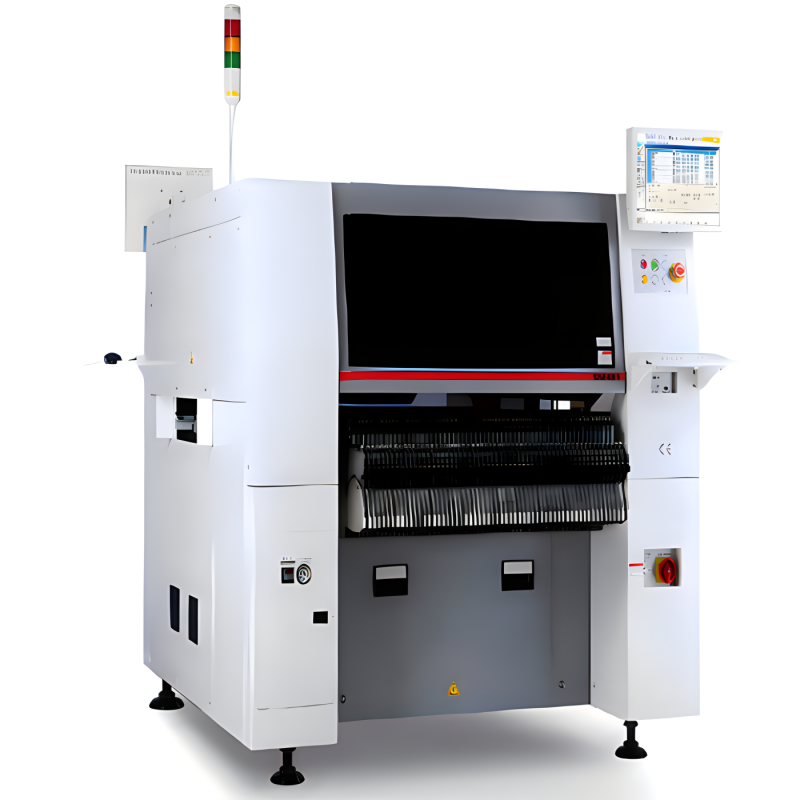
Hanwha SM482PLUS pick and place machine
Advantages:
- Designed for high-mix, high-volume production with quick changeover capabilities.
- Efficient for both fine-pitch and large components placement.
- High-speed operation with accurate placement, improving overall throughput.
Key Parameters:
- Placement Speed: Up to 48,000 CPH
- Placement Accuracy: ±0.03mm (at 3σ)
- Feeder Capacity: Up to 96 feeders
- PCB Size: Max. 510 x 460 mm
- Component Range: Supports components from 0201 to large ICs
- Vision System: 2D/3D automatic optical alignment system
- Nozzle Types: Automatic nozzle changer for flexibility
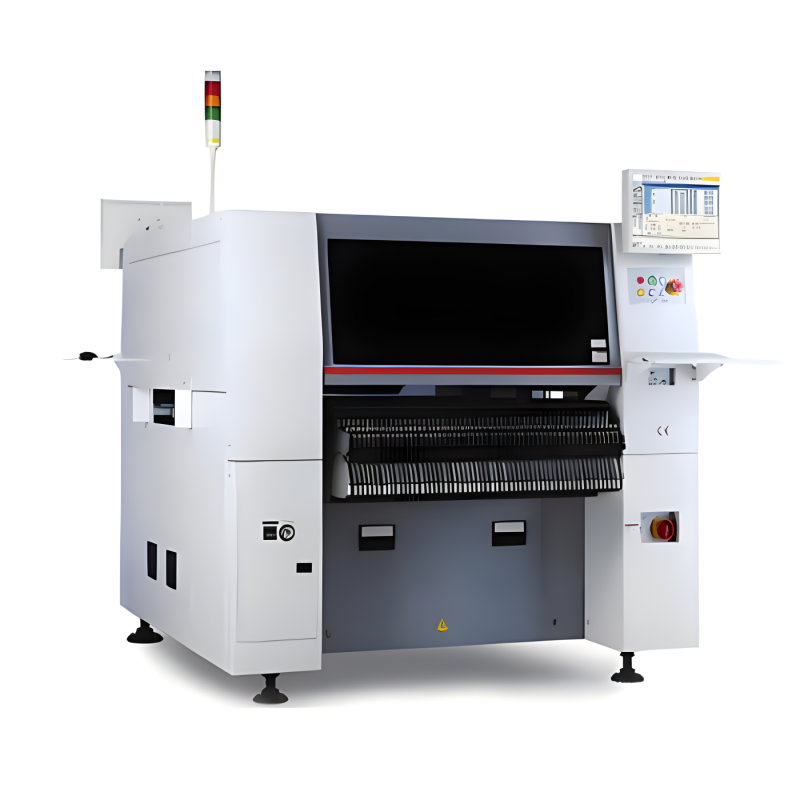
Hanwha SM471PLUS pick and place machine
Advantages:
- Excellent for small to medium-sized production runs, offering versatility and flexibility.
- Capable of handling a variety of components, from small to large.
- Known for high accuracy and stability, providing consistent quality in production.
Key Parameters:
- Placement Speed: Up to 45,000 CPH
- Placement Accuracy: ±0.05mm (at 3σ)
- Feeder Capacity: Up to 80 feeders
- PCB Size: Max. 510 x 460 mm
- Nozzle Types: Suitable for various component sizes
- Vision System: High-precision 2D vision system for accuracy
- Power Consumption: Energy-efficient design
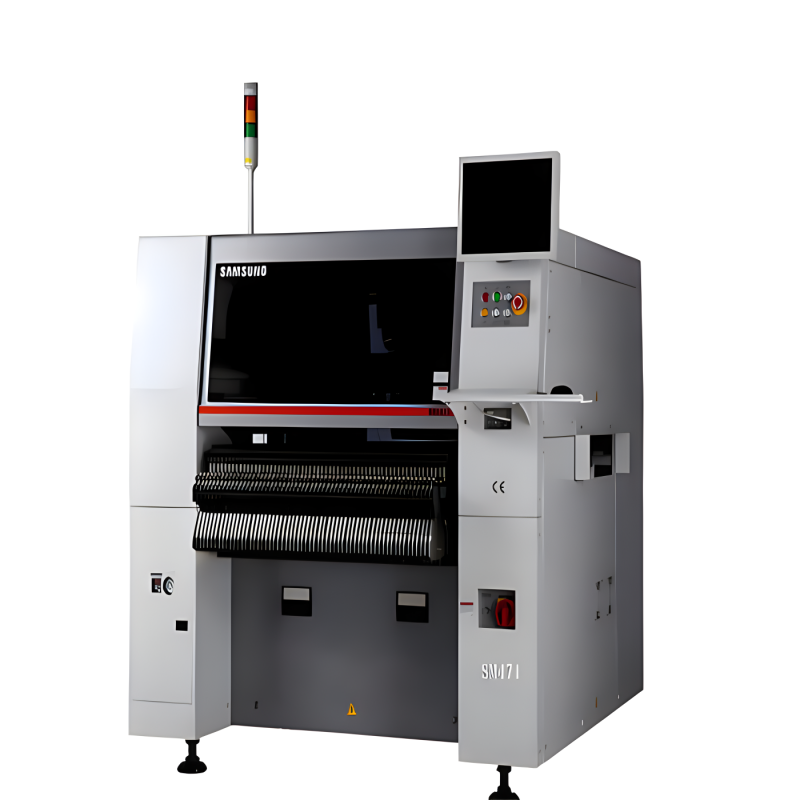
Hanwha SM485P pick and place machine
Advantages:
- The SM485P offers high-speed placement, high flexibility, and efficient production for diverse applications.
- Excellent for both high-mix and high-volume production environments.
- Strong precision and ability to handle fine-pitch components and a wide range of PCB sizes.
Key Parameters:
- Placement Speed: Up to 48,000 CPH
- Placement Accuracy: ±0.03mm (at 3σ)
- Feeder Capacity: Up to 104 feeders
- PCB Size: Max. 510 x 460 mm
- Nozzle Types: Automatic nozzle changer for versatility
- Vision System: 3D vision for fine-pitch and high-precision placement
- Component Range: Supports 0201 components and large packages (e.g., QFP, BGA)
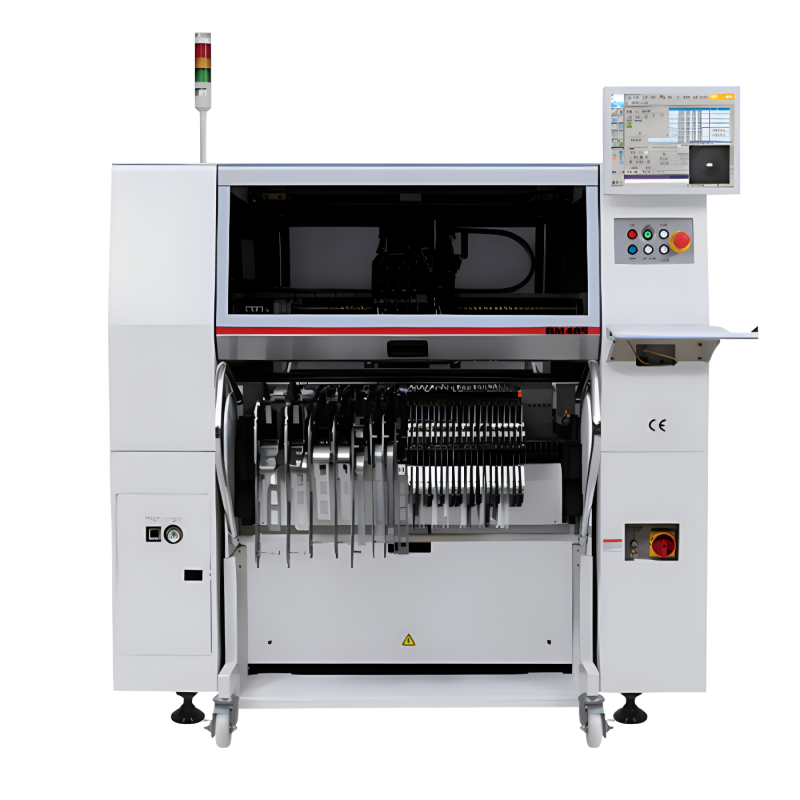
Hanwha DECAN S1 pick and place machine
Advantages:
- Compact and versatile, designed for small to medium batch production, offering excellent cost performance.
- High flexibility, capable of handling a variety of components with fast changeover.
- Easy-to-use software interface and efficient operation.
Key Parameters:
- Placement Speed: Up to 20,000 CPH
- Placement Accuracy: ±0.04mm (at 3σ)
- Feeder Capacity: Up to 30 feeders
- PCB Size: Max. 300 x 250 mm
- Vision System: 2D vision system for precise component alignment
- Nozzle Types: Multiple nozzles for small to medium components
- Power Consumption: Low power consumption for cost-effective operation
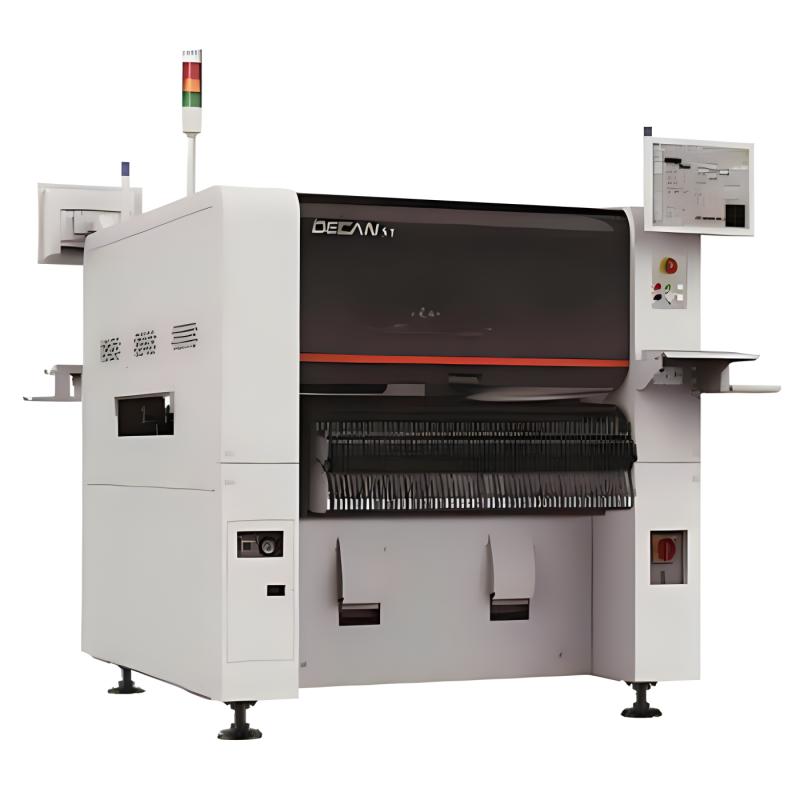
Hanwha DECAN S2 pick and place machine
Advantages:
- Designed for high flexibility and high-mix environments, providing fast changeover for multiple product types.
- Suited for small to medium-scale production with a focus on high efficiency and minimal downtime.
- Compact design, making it suitable for small production facilities with limited space.
Key Parameters:
- Placement Speed: Up to 22,000 CPH
- Placement Accuracy: ±0.04mm (at 3σ)
- Feeder Capacity: Up to 32 feeders
- PCB Size: Max. 350 x 250 mm
- Nozzle Types: Flexible nozzle options for a wide range of components
- Vision System: 2D/3D vision for component inspection and accuracy
- Power Consumption: Designed for energy efficiency in small production environments
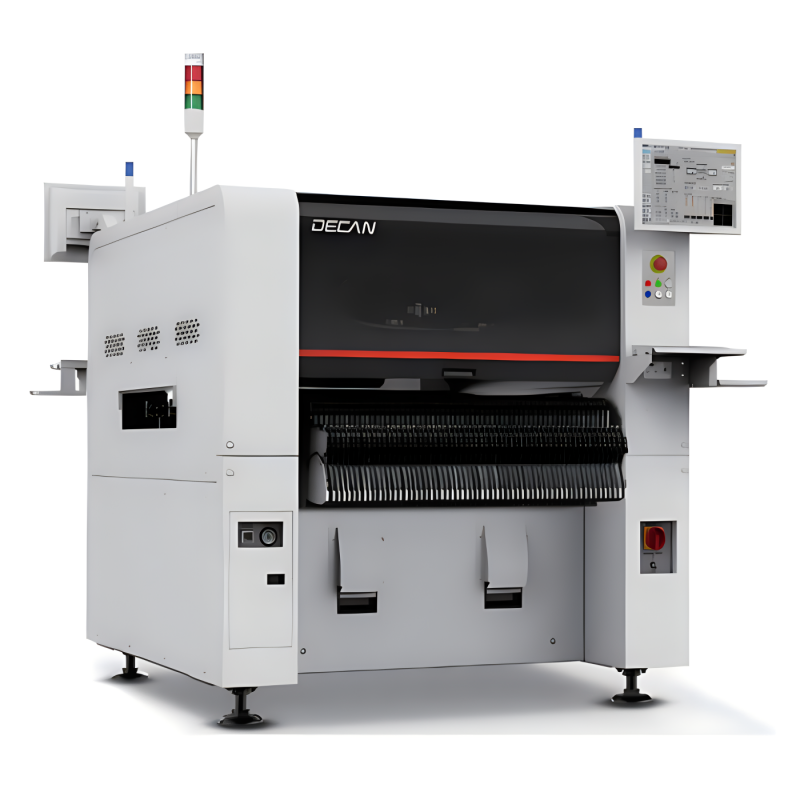
Send Inquiry Now !
Contact us to choose the best smt pick and place machine for you
We Provide Top Brands of Pick and Place Machines – New and Refurbished Options Available
Looking for high-quality pick and place machines? We offer a comprehensive selection of new and refurbished machines from all the leading brands, including Hanwha, Fuji, Yamaha, Panasonic, and more. Whether you’re upgrading your production line or expanding your capabilities, we have the right solution for you at competitive prices.
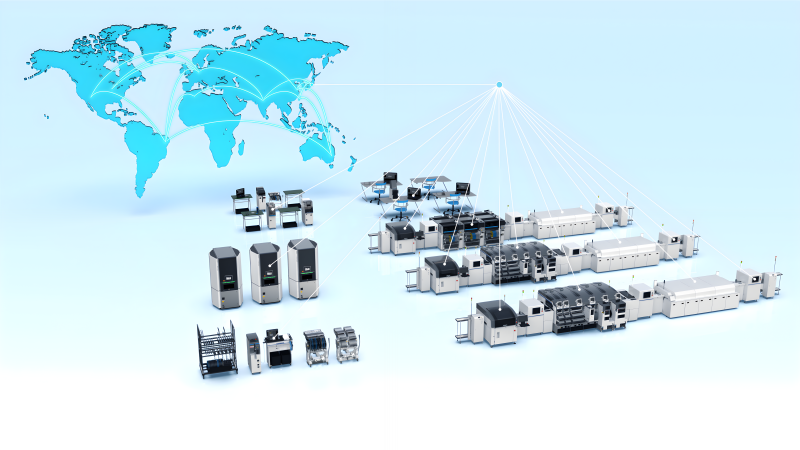
Contact Us Now !
Contact us today for a customized quote and discover how we can help you optimize your production with reliable, cost-effective equipment.




